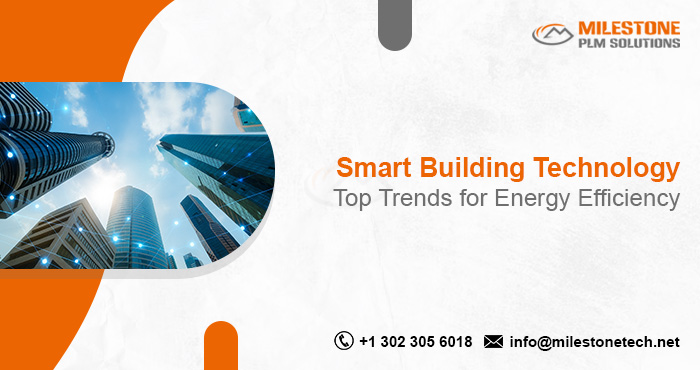Smart Building Technology: Top Trends for Energy Efficiency

In today’s construction and real estate sectors, smart building technology is transforming how energy is consumed, managed, and saved. As climate change accelerates and energy costs soar, the need for sustainable, energy-efficient buildings has never been more urgent. Fortunately, advancements in intelligent systems are paving the way for smarter, greener infrastructure.
This blog explores the top trends in smart building technology that are driving energy efficiency, making buildings more responsive, cost-effective, and sustainable.
What is Smart Building Technology?
Smart building technology refers to the integration of automation systems, IoT (Internet of Things), AI (Artificial Intelligence), and data analytics into building operations. These technologies optimize HVAC systems, lighting, security, and energy management, often without human intervention.
By connecting various components, a smart building can adapt to occupant needs, monitor resource usage, and reduce operational costs. But more importantly, it plays a vital role in reducing the building’s environmental footprint.
Top Trends in Smart Building Technology for Energy Efficiency
Let’s explore the emerging trends that are shaping the energy-smart buildings of tomorrow.
IoT-Powered Energy Monitoring Systems
One of the most impactful trends is the use of IoT sensors for real-time energy monitoring. These sensors collect data on temperature, lighting, occupancy, and energy consumption. When analyzed, this data reveals patterns and inefficiencies that would otherwise go unnoticed.
For instance, an HVAC system can automatically adjust based on the number of people in a room, reducing unnecessary energy usage. As a result, energy is saved without compromising comfort.
Transition tip: Moreover, building managers gain real-time insights into system performance, helping them make proactive decisions.
AI and Predictive Analytics
Artificial Intelligence is playing a central role in improving building efficiency. With predictive analytics, AI algorithms can forecast energy demand based on historical data and environmental factors.
For example, rather than running a chiller system at full capacity throughout the day, AI can predict peak usage times and adjust operations accordingly. Not only does this reduce waste, but it also prevents overloading systems during high-demand periods.
Furthermore, machine learning continuously improves these predictions, making buildings even smarter over time.
Automated Lighting and Climate Control
Lighting and HVAC systems are major energy consumers. Smart building technology now includes automated controls that adjust lighting and temperature based on real-time conditions.
Daylight sensors dim indoor lights when natural light is sufficient. Similarly, occupancy sensors turn off systems in unused spaces. These simple yet powerful automations can reduce energy consumption by up to 30%.
Transition tip: Additionally, smart thermostats and zoning systems allow for more precise temperature control, leading to further savings.
Smart Glass and Dynamic Windows
Smart glass is another emerging innovation in smart building technology. These windows adjust their tint automatically based on sunlight and temperature levels.
By reducing heat gain in summer and retaining warmth in winter, smart glass significantly lowers the load on HVAC systems. This not only enhances occupant comfort but also contributes to lower utility bills.
Transition tip: When combined with automated blinds or shading systems, the energy-saving potential is amplified even further.
Energy Storage and Smart Grids
Energy storage systems—like advanced batteries—are being incorporated into smart buildings to manage energy loads and reduce peak demand charges. These systems store excess energy generated during low-usage hours and release it during peak times.
Smart grids take this a step further by connecting buildings to broader networks. They facilitate demand response strategies, where buildings adjust their energy usage based on grid signals, often earning incentives for reduced consumption during high-demand periods.
Benefits of Smart Building Technology
The implementation of smart building technology brings several long-term benefits:
-
Reduced operational costs through energy optimization
-
Lower carbon footprint, supporting ESG and sustainability goals
-
Improved occupant comfort and productivity
-
Real-time insights into building performance and energy trends
-
Scalable solutions for future upgrades and innovations
Conclusion
As the world moves toward a more sustainable future, smart building technology is no longer a luxury—it’s a necessity. From intelligent HVAC systems and adaptive lighting to AI-driven analytics and renewable integration, the possibilities for energy efficiency are vast and rapidly evolving.
By adopting these trends, building owners and facility managers can not only cut costs but also contribute meaningfully to environmental sustainability.
It’s time to make our buildings smarter—because smart means sustainable.
Follow Milestone PLM Solutions for AEC Industry Updates, CAD Tips and Global Construction News.
Milestone PLM Solutions with its exclusive delivery center in India is a global CAD, BIM outsourcing partner serving the needs of the AEC industry since 2004. MILESTONE focuses on the unique needs of clients and believe in tackling real-life problems with efficiency, smooth and ease.
The MILESTONE team can assist you with DD Set, CD Set, BIM Modeling, Rendering, walk through and more. We support multiple BIM software including AUTOCAD REVIT, Architecture cad, Cabinet Vison, Vector works etc. Our approach is to provide a dedicated team for each customer over ongoing project and deliver the quality output consistently.
With our state of art technology and large talent pool of Engineers & Architects, we are developing best in class solutions for our customers across the globe. We align with your culture and values to form unbreakable partnerships and are primed for success with over 100 employees and 150 customers in the US, Europe, India, and Asia.
You can email us at info@milestonetech.net and can log in to our website www. milestonetech.net to know more about our services and our work portfolio or contact us on +1 302 305 6018
